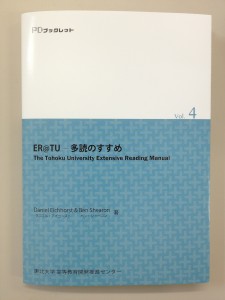business curriculum eikaiwa extensive listening extensive reading language courses materials school management self-study teaching technology university
by sendaiben
10 comments
Self-access centres in private language schools
I have always wanted to have some kind of self-access centre (room?) at Cambridge English. I feel it would offer a lot of value to some students, as well as make what we do more effective.
The room would have books, computers, and comfortable chairs. It would have nice lighting and be a quiet, pleasant place.
Students would come and use the room whenever they wanted, and regular classes would also include self-study time (students would have to spend 30-60 minutes of a 90- or 120-minute class doing self-study).
We may have the chance to create something like this this year as our current classroom is too small and there is very little real estate available in Sendai after the 2011 disaster so we have rented an apartment above the school to have classes in.
I would like to do something like this at university as well. For now, I think the best chance is to work with the library.
Does anyone have any experience of implementing this kind of system?
(photo is the Self-Access Centre at Kanda University)
curriculum extensive reading graded readers language courses materials online resources school management teaching Uncategorized university websites
by sendaiben
leave a comment
ER@TU website
The ER@TU (Extensive Reading at Tohoku University) Project now has a website!
Features of possible interest to teachers include the Guide to ER (bilingual page aimed at students explaining extensive reading and this particular program) and the Word Counts page, which lists graded reader titles and word counts only (aimed at teachers and students).
The website has both PC and mobile versions, and is not quite finished yet (to put it mildly!).
The site is a WordPress installation on Bluehost, as explained very thoroughly by Michael Hyatt in this excellent blog post. I paid for three years in advance, bringing the monthly cost to around 400 yen. This works very well, as my contract is also up in three years time, so hopefully this will give me some leverage with the university 😉
Please leave a comment below if you have any questions or suggestions about the site.
curriculum expectations extensive reading language courses materials Reading school management teaching university
by sendaiben
26 comments
The Tohoku University Extensive Reading Manual
I am so thrilled to finally have this on my desk.
This is a 136-page bilingual handbook describing the extensive reading program at Tohoku University. It includes a detailed description of the curriculum, examples of handouts and other materials, and guides to adapting the program to other contexts.
For a limited time, free copies are available. Please leave a comment with your name and work address if you would be interested in receiving one. Alternatively, see me (Ben Shearon) at the JALT Pan-SIG Conference in Nagoya (May), the 2nd Extensive Reading World Congress in Seoul (September), or the JALT National Conference 2013 in Kobe (October) to get a copy.
business curriculum online resources reviews self-study technology websites
by sendaiben
leave a comment
Udemy online learning platform
I’ve been using Udemy, an online content delivery platform, to learn more about Excel, mac OS, and Windows 8. I think the site has a lot of potential for both teachers and learners, so I am going to do a quick review here.
Content
Right now the site has thousands of free and premium courses, ranging from software to business to self-defence to language learning to automobile maintenance. The cost of a course ranges from free to several thousand dollars, but most are priced between 50-100 US$. There are a lot of software courses at the moment, but it is possible to find other topics.
Delivery
The delivery system is basically video based, with the instructor talking learners though their topic in a series of lessons. In the courses I have seen so far, each video lesson tends to be just a few minutes long, allowing you to study whenever you like and repeat lesson easily.
Potential
The interesting thing for teachers is that it seems to be fairly painless to upload courses to the system. I am very interested in creating some courses, both as a way to diversify my income (I am worried about my future employment due to the recent changes in labour law in Japan, but that is a topic for another day) and also as a way of getting content to my students (by setting the price to zero and telling them to access content through Udemy.
Conclusion
So that is Udemy so far for me: useful for learning things and filling in gaps in knowledge (the basic excel course didn’t have anything groundbreaking for me, but I have learned something in most of the lessons so far), great future potential, and a very interesting player in the field of online delivery.
Has anyone else tried Udemy? What did you think?




